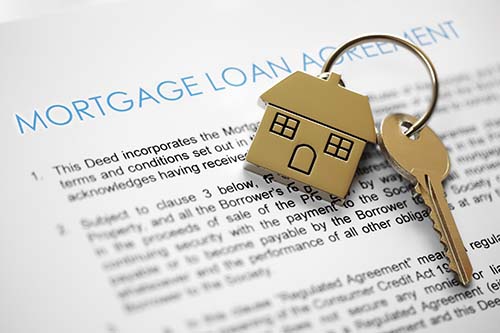 Are you in the market for a new home? If you plan on using mortgage financing to buy your next home you’ve likely heard the phrase “loan-to-value” or the acronym “LTV” before. Let’s take a quick look at the loan-to-value ratio including why it’s important, how to calculate it, and how it can affect your mortgage.
Are you in the market for a new home? If you plan on using mortgage financing to buy your next home you’ve likely heard the phrase “loan-to-value” or the acronym “LTV” before. Let’s take a quick look at the loan-to-value ratio including why it’s important, how to calculate it, and how it can affect your mortgage.
What is the Loan-to-Value or LTV Ratio?
In short, the LTV ratio is a number that compares how much money you owe against your home with its resale value in the marketplace. A low LTV ratio indicates that you have far more equity in your home than you owe in mortgage payments; conversely, a high LTV ratio indicates that you owe almost as much as your home is worth.
Calculating your LTV ratio is easy. Simply divide the amount that you have (or will have) remaining in your mortgage by your home’s value. For example, if you own a home worth $250,000 and you still owe $150,000 on your mortgage, the calculation would be $150,000 divided by $250,000, which gives you an LTV ratio of 0.6 or 60 percent.
Why is the LTV Ratio Important?
Your LTV ratio is important for a number of reasons. First, your mortgage lender will use this figure as part of their risk calculation when they assess your financial suitability for your mortgage. If you’re only putting 5 percent of the purchase price in as a down payment you’ll have an LTV ratio of 95 percent, which is a more risky loan than one with an LTV ratio of 30 percent and thus will almost certainly come with a higher interest rate.
If you have an LTV ratio higher than 80 percent and you’re getting a mortgage from a conventional lender you’ll also be required to pay for private mortgage insurance or “PMI”. Although PMI rates generally sound quite low – in the neighborhood of 0.5 to 1 percent – they can add hundreds of dollars to your monthly mortgage payment. Note that PMI may not apply to you if you’re seeking out a government-backed mortgage from Veteran’s Affairs, the USDA, or the FHA.
While the LTV ratio might seem simple, this number can affect your mortgage in a variety of ways. Contact your local mortgage advisor today to learn more about the LTV ratio and to have your questions answered by an experienced professional.
 Are you in the market for a new home? If you are considering a mortgage, you may be curious about mortgage insurance, commonly referred to as PMI or MI. Let’s explore the topic of mortgage insurance, including how it works to reduce risk and how it benefits you as the mortgage borrower.
Are you in the market for a new home? If you are considering a mortgage, you may be curious about mortgage insurance, commonly referred to as PMI or MI. Let’s explore the topic of mortgage insurance, including how it works to reduce risk and how it benefits you as the mortgage borrower. Whether you have recently graduated from college or are getting close to retirement, it’s likely that you have given some thought as to how you can grow your net worth. You might have invested in stocks, picked up a few bonds or have a 401(k) plan set up to help fund your retirement. But have you considered buying real estate as part of your portfolio?
Whether you have recently graduated from college or are getting close to retirement, it’s likely that you have given some thought as to how you can grow your net worth. You might have invested in stocks, picked up a few bonds or have a 401(k) plan set up to help fund your retirement. But have you considered buying real estate as part of your portfolio? Technology has come a long way, and you might be thinking about turning your house into a smart home. Now, there are a lot of smart home products available, and you may have a difficult time keeping track of which ones are best for you. What are some of the top smart home products you need to know about?
Technology has come a long way, and you might be thinking about turning your house into a smart home. Now, there are a lot of smart home products available, and you may have a difficult time keeping track of which ones are best for you. What are some of the top smart home products you need to know about? A mortgage application is typically several pages in length, and it requires you to provide a considerable amount of information about your personal, professional and financial life. Some mortgage applicants may not have access to all of the information when completing the application, and others may simply skim over the form and provide incomplete answers. These are only a few of the reasons why information on the mortgage application may not be accurate, but there are several key reasons why applicants should avoid giving inaccurate information.
A mortgage application is typically several pages in length, and it requires you to provide a considerable amount of information about your personal, professional and financial life. Some mortgage applicants may not have access to all of the information when completing the application, and others may simply skim over the form and provide incomplete answers. These are only a few of the reasons why information on the mortgage application may not be accurate, but there are several key reasons why applicants should avoid giving inaccurate information. There is a lot of jargon that comes with purchasing a home. Even though this could be confusing, purchasing a home is also a significant decision. Therefore, it is critical for everyone to understand exactly what they are signing before they scribble their name on the dotted line. In some cases, a co-borrower or a co-signer (also called a non-occupying co-borrower) could be needed to strengthen the application. What is the difference between these two terms?
There is a lot of jargon that comes with purchasing a home. Even though this could be confusing, purchasing a home is also a significant decision. Therefore, it is critical for everyone to understand exactly what they are signing before they scribble their name on the dotted line. In some cases, a co-borrower or a co-signer (also called a non-occupying co-borrower) could be needed to strengthen the application. What is the difference between these two terms?  If your personal budget is similar to many other people’s budgets, your home mortgage payment is by far the largest expense that you pay for each month. In fact, this payment may easily account for 20 or 25 percent or more of your take-home income.
If your personal budget is similar to many other people’s budgets, your home mortgage payment is by far the largest expense that you pay for each month. In fact, this payment may easily account for 20 or 25 percent or more of your take-home income. Are you thinking about buying a new house or condo? If so, you’ve likely given some thought to your mortgage and as to how you can pay as little as possible in order to own your new home.
Are you thinking about buying a new house or condo? If so, you’ve likely given some thought to your mortgage and as to how you can pay as little as possible in order to own your new home. For many homeowners, their mortgage payment contains more than just principal and interest. A little something called PMI could be representing a significant portion of that payment, and it’s important for home buyers to understand this cost.
For many homeowners, their mortgage payment contains more than just principal and interest. A little something called PMI could be representing a significant portion of that payment, and it’s important for home buyers to understand this cost.